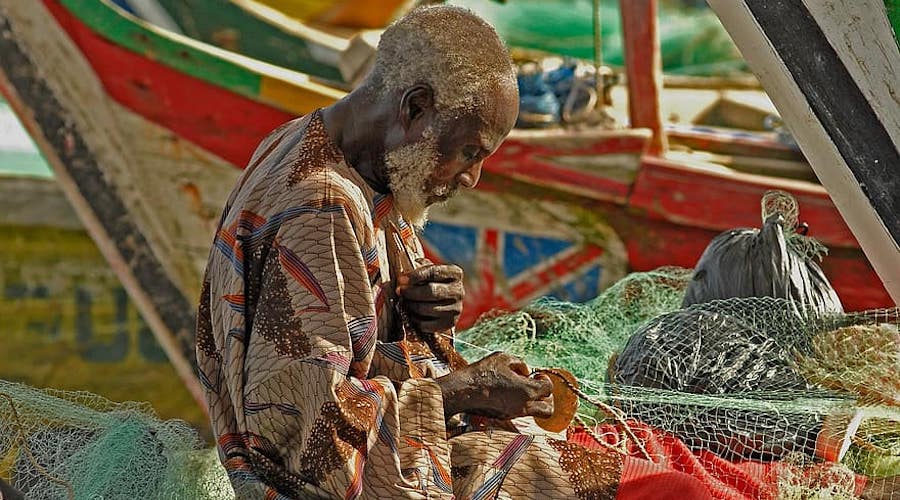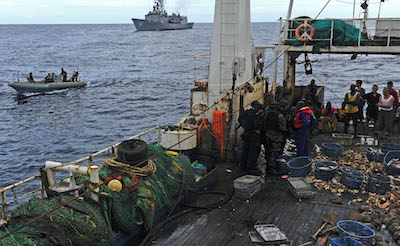
Ghanaian fisherman. Photo from Pikist.
Fish catches in Africa have reached a peak and, in many cases, have moved into a declining trend that threatens the food security and economic development of coastal areas.
A new study by researchers at the University of Western Australia, the University of British Columbia and Ecotrust Canada analyzed fishery yields in the seven Large Marine Ecosystems or LMEs that surround the African continent and found that most fisheries in the region rely on overfished resources.
“Using the Sea Around Us database of reconstructed marine fisheries catches and indicators derived from the data, like the Marine Trophic Index, we reviewed the main catch features and landed values over the last 65 years generated by the fisheries in the Canary Current, Guinea Current, Benguela Current, Agulhas Current, Somali Coastal Current, Red Sea and Mediterranean Sea Large Marine Ecosystems,” said Dirk Zeller, lead author of the study and director of the Sea Around Us – Indian Ocean at the University of Western Australia.
The synthesis showed that between 1950 and the late 1960s, catches grew almost exponentially from around 3 million tonnes per year to 12 million tonnes per year, driven mainly by fisheries in the Canary Current LME, located between Morocco and Liberia, and the Benguela Current LME, located between Côte d’Ivoire and Angola. In the 1970s, this rapid growth was replaced with a more gradual increasing catch trend, which lasted until a peak catch of 19 million tonnes was reached in 1988. Thereafter, catches started declining to levels around 14 million tonnes per year in recent times.
“This declining trend is a cause of concern as fish is a crucial economic resource and a major source of nutrients for coastal communities in these areas,” Zeller said. “The situation becomes more troublesome if we take into consideration that most industrial fleets operating around the continent are majority-owned by foreign companies, which means that they are just engulfing the little that is left.”

Chinese vessel fishing in Senegal’s exclusive economic zone in the Atlantic Ocean June 27, 2012. Photo by MC1 Daniel Mennuto, Wikimedia Commons.
As marine resources have started to dwindle in near-shore areas, both large-scale and small-scale fisheries have had to switch from the previously large fish that they were able to catch to smaller fish and invertebrates that occupy the lower levels in the marine food chain.
Industrial fisheries have also had to move further offshore but even by doing this, in many cases, they haven’t been able to catch as much bluefish or tuna as they would have expected because these resources have also been overfished.
“In this study, we show that the fishing down the food web effect has occurred at some point in virtually all LMEs, and still occurring in three of them that make up the West Coast of Africa, namely the Canary Current, Guinea Current and Benguela Current LMEs,” said Daniel Pauly, co-author of the study and principal investigator of the Sea Around Us initiative at the University of British Columbia’s Institute for the Oceans and Fisheries.
“This is a serious problem for both the domestic food security of the African countries associated with these waters and the global seafood supply driven by industrial and distant-water fishing fleets,” Pauly said.
In view of these findings, the study calls for better management, monitoring, compliance and policy efforts around Africa, with a strong emphasis on regional cooperation, to help rebuild fish stocks.
The study “Comparative fishery yields of African Large Marine Ecosystems” was published in Environmental Development https://doi.org/10.1016/j.envdev.2020.100543.
To schedule interviews with the authors, please, contact Valentina Ruiz-Leotaud v.ruizleotaud(at)oceans.ubc.ca


